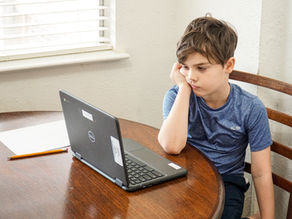How has Covid changed children's play?
- Mar 22, 2021
- 3 min read
Updated: Nov 20, 2023
Happy March! With schools going back across the UK, and the vaccine rollout continuing, I hope you feel, as we do, that the end of this strange and stressful chapter is in sight. We aren’t there yet, and have to continue being careful, but this is, I hope, the beginning of the end. But while the last year has been tough, it has also provided an unprecedented opportunity for scientists to look at how our behaviour changes when our routines are completely upended.

I recently had the opportunity to speak with Dr Suzanne Egan, lecturer in the department of psychology at Mary Immaculate College, University of Limerick . She is fascinated by play, and saw a chance to investigate how children’s play changed during lockdown. She conducted a survey with 500 parents in Ireland, during their strict lockdown, and found that, like her own children, 1/3 of those in the study brought the pandemic into their play somehow. This ranged from playing ‘Covid tag’, to building a doll’s hospital, or wiping down the ‘groceries’ when playing shop. While this may sound alarming, Egan believes play gives children a chance to process what is going on in their lives, in a safe environment. It has long been used as a form of therapy with young children, so this could be their way of dealing with the changes to their lives.
She also found the types of play children engaged in changed- there was more outdoor play, more reading, and (unsurprisingly) more screen time. The majority of children in the study, she found, spent 2 hours or less a day on school work. But, she stressed this wasn’t necessarily a problem. For one thing, a lot of learning happens through play in the early years, so the extra time playing might have benefits. And, although children may normally spend around 6 hours in school, much of that time isn’t concentrated study. Working at home, with 1 on 1 guidance from a parent, is very different to being in school. In fact, many families said their children enjoyed the extra freedom, and felt closer to parents and siblings. For others, though, it was the social aspect of school they missed- interacting with their peers, and their teachers.
It will be interesting to see how children, parents and teachers adapt to being back in school after such a huge upheaval of their lives, and whether there will be knock on impacts. Egan is hopeful, believing the flexibility of children’s brains means most of them will handle the change fairly easily. It is those children who are already more vulnerable, she thinks, that may have problems, and support will need to be provided on a case-by-case basis.
Teachers may have a bit of an uphill battle ahead, ensuring that no-one gets left behind, and that everyone has covered the important topics in the curriculum, whatever their situation during home schooling. But it’s important to remember that learning is about more than just the curriculum. Hopefully, the extra skills kids have learnt throughout the pandemic while helping with housework, gardening, or using their imaginations to play alone will stand them in good stead for the future.

If you are looking to keep the play going now students are back in school, why not book one of our shows? They are perfect if you are looking for something a bit different, and to get kids thinking about how their brains work.










